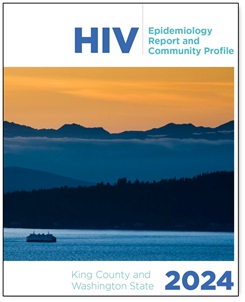HIV/AIDS data
Annual HIV reports include data tables, figures, and narrative describing the local and state-wide epidemiology of HIV in King County, Washington.
Short URL: kingcounty.gov/hiv/data
2024 Annual Report (2.6 MB)
This report, which includes data through the end of 2023, focuses on each of the four Ending the HIV Epidemic (EHE) pillars:
1) Diagnose, 2) Treat, 3) Prevent, and 4) Respond.
Our King County HIV Goals and Metrics Dashboard reflects national and local goals for 2025 that are aligned with the EHE pillars.
We welcome feedback on the information presented as we are always striving to ensure this report is accessible to and meets the needs of our community.
Past annual reports
- 2013 (1st half of 2013 only, 2.5 MB)
- 1st half 2012 (2 MB)
- 2nd half 2012 (2.1 MB)
- 1st half 2011 (1.1 MB)
- 2nd half 2011 (3.1 MB)
- 1st half 2010 (1.5 MB)
- 2nd half 2010 (399 KB)
- 1st half 2009 (1.5 MB)
- 2nd half 2009 (3.1 MB)
- 1st half 2008 (582 KB)
- 2nd half 2008 (1.3 MB)
- 1st half 2007 (390 KB)
- 2nd half 2007 (359 KB)
- 1st half 2006 (315 KB)
- 2nd half 2006 (609 KB)
- 1st half 2005 (702 KB)
- 2nd half 2005 (556 KB)
 Translate
Translate
